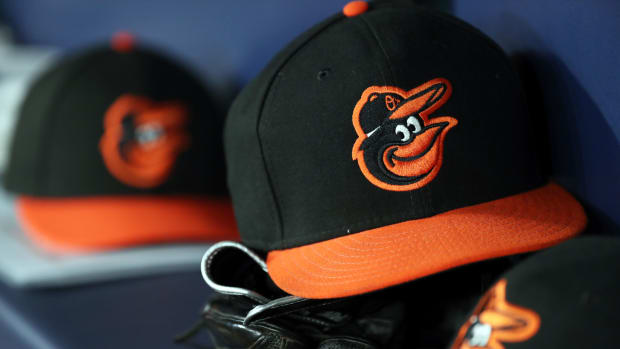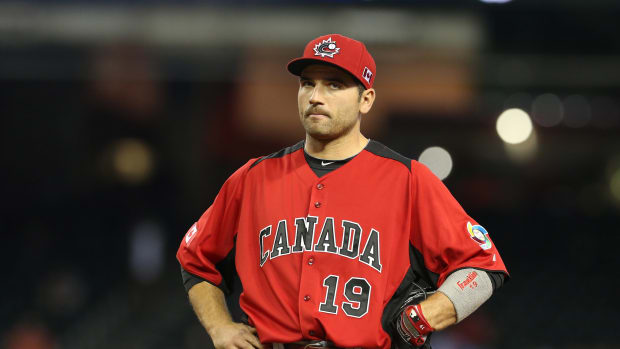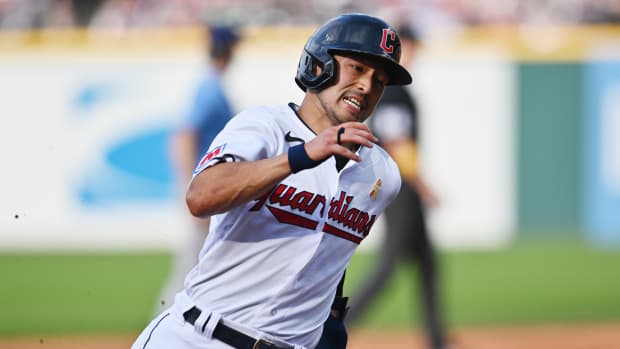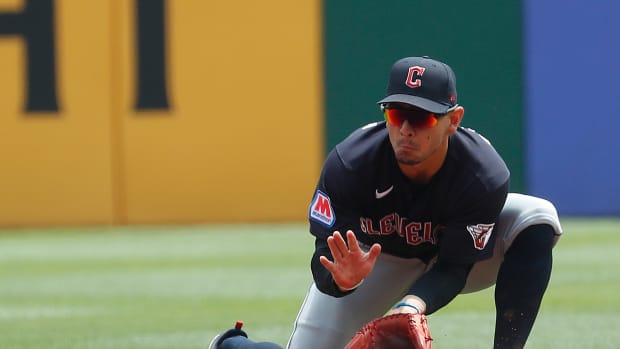Kim Ng Made History. Now Comes the Hard Part
Kim Ng knew people would care. When she became the Marlins’ general manager in November, she expected a few hundred messages, some calls, an exhausting number of interview requests. Instead the response nearly incinerated her phone battery: She got thousands of messages. Michelle Obama tweeted about her. President Joe Biden asked her to speak at an event following his inauguration. (She accepted.)
All these people told her what her career move meant to them, and to their daughters. But most of them could not begin to understand what it meant to Ng. She had wanted this title for decades, but the minute she accepted it, it ceased to be about her. As she likes to say, a weight had been removed from one shoulder—and placed on the other. Now the pressure is on Ng to win, not just for herself but for those whose future opportunities may hinge on her performance.
And almost none of her well-wishers knew this: When Miami CEO Derek Jeter first phoned to talk about her dream job, Ng wondered how to say no.
She had gotten this call many times—she ballparks double digits. A team was looking for a GM, and would she like to interview? Some owners just wanted to check a box: We talked to a woman, and a Chinese American woman at that! No major North American men’s sports franchise had ever hired a woman as GM, and no one of East Asian descent had ever run a baseball team; just interviewing her made a team look progressive. Ng knew what they were doing, but she still prepared for the meetings—15 hours a day for weeks—as if they were all giving her an honest shot.
Now Jeter was on the phone, asking to talk. He had just ousted Michael Hill, whom Ng, now 52, had known for years. She had been working for Major League Baseball’s central office for close to a decade, and she had made peace with the idea that she would never sit in one of the 30 big chairs. “Always going to be the bridesmaid,” Ng says. Some of that was self-protection, she acknowledges now. But she really believed that her career would be complete without the title, that she did not need the validation of MLB’s fraternity of owners.
“I think that takes a certain self-confidence, right?” she asks. “To say, ‘It is what it is. And I’m not going to let myself necessarily be defined by that.’ ”
She told Jeter she would think about it. She spoke to Joe Torre, special assistant to commissioner Rob Manfred and her boss at MLB. Torre had been their mutual coworker two decades ago, when they won three straight World Series with the Yankees—Jeter as shortstop, Torre as manager, Ng as assistant GM. You know Derek, Torre told her. This isn’t a token call. If he’s asking, you know it’s serious.
She appreciated Torre’s support. But this time, she wasn’t worried that the interview was fake. She was worried it was real.

After a strong rookie year from Sixto Sánchez (3.46 ERA) helped power Miami to a surprising 2020 playoff run, there will be pressure for Ng’s Marlins to contend, despite limited spending to improve the roster.
Bob Levey/Getty Images
Jeter had known Ng for 22 years, but he could not truly understand what it was like to be her. The lines on her résumé—seven years starting out with the White Sox, one as the director of player records and waivers for the American League, 13 as assistant general manager for the Yankees and Dodgers, and 10 as MLB’s senior vice president of baseball operations—do not tell her whole story. Everywhere she went, nobody looked like her.
“Every day, for 31 years in her job,” says her husband, Tony Markward, “she has to go in and, to any new person she meets, she has to make the case for why she belongs there.”
Ng had a typical childhood for a baseball fan: She slept under a poster of the 1978 Yankees and played stickball in Queens, then was the MVP of her softball team at the University of Chicago. But when she started an internship with the White Sox after the ’90 season, she was still the woman in a man’s game. Coworkers called her Honey and asked her to get them coffee. She shrugged them off. She took a white legal pad with her everywhere; assistant GM Dan Evans, who hired her, knew that if he saw her scribbling notes in the morning, she would stop by his office in the afternoon with a question: Why did you do that? Evans was 30. He wasn’t always sure why he had done that. “She really was helpful to me,” he says. “She forced me to inquire to myself as to why I had the opinions [I had].”
The focus of her internship was computer administration and salary arbitration. Evans told her she could make herself indispensable by learning the arcana of the collective-bargaining agreement. “She separated herself immediately,” he says. By the time she was 25, he would tell people, once Ng was out of earshot, that she would be baseball’s first female GM.
In 1997 she left the White Sox for the AL office, where she spent hours on the phone explaining the minutiae of the major league rule book to team executives. A young Yankees assistant general manager named Brian Cashman was impressed enough that when he was elevated to GM in ’98, he hired Ng as his assistant. “Right away, [I thought], Well, I’m used to calling Kim all the time,” Cashman says now. “It would just be so easy if I could just have her in the office next to me.”
On the conference call announcing her hiring, someone asked, “Kim, are you after Brian Cashman’s job?”
“No,” she said. “Brian and I are good friends, and I am really looking forward to working with him. He is a good man.”
Cashman, cackling, revealed himself as the questioner. Later on the call, Ng acknowledged that she hoped to lead a team one day. “I didn’t realize it was quite possible until recently, but I think it’s out there,” she said.
Over the next three years, the idea tugged at her. Ng wasn’t after Cashman’s job, but she wanted to be a general manager somewhere, so she decided to let her contract expire at the end of the 2001 season. After Game 5 of the World Series, with the finale at Yankee Stadium that year, she and Markward sat for hours behind home plate as the cleaning crew turned off the lights. She loved it there. But she knew she had to leave.
She took the same position with the Dodgers, by this time run by Evans, who offered her expanded responsibilities. Torre, who managed the team from 2008 to ’10, laughs now, thinking of how heavily they leaned on her knowledge of rules and regulations. Bill Bavasi, Los Angeles’s player development chief when Ng arrived and the former Angels GM, says, “I wouldn’t cross the street without talking to her.”
When the club asked her to set up a video system for major leaguers to review at bats, she set one up for the minor leaguers, too. No franchise had ever done that. Nearly everyone who talks about her offers a version of this thought: She is generally the smartest person in the room, but she rarely acts like it.
“I mean this with the utmost respect,” says Logan White, the scouting director when she worked in L.A. “She is a great plagiarizer. She doesn’t have to be the inventor of it. She’s going to go, Oh wow, that works. Let’s use that.”
Ng was savvy enough not to complain about the challenges of being a woman in baseball and smart enough to know she had to meet them. When Evans put her in charge of negotiations with Japanese lefthander Kazuhisa Ishii in 2002, she met extensively with Acey Kohrogi, L.A.’s director of Asian operations. She practiced every detail of how to comport herself in Japan, down to how to hand his representatives her business card: holding it in two hands, with the writing facing them. In Tokyo, Kohrogi says, “She was right on the money.” Ishii signed with the Dodgers.
Most of all, Ng observed. “She kind of reminds me of a really, really good scout,” says Vance Lovelace, who scouted for the Dodgers. “You can’t listen if you’re always talking.”
Ng trained herself to be a general manager, even as she wondered whether she would ever get the chance. She would notice which low-level employees seemed intimidated and give them small assignments as a way to build their confidence and identify their strengths. When Evans was fired before the 2004 season, Ng, then 35, stayed on to work for 31-year-old Paul DePodesta. That fall, some 10 minutes after the team Evans built won the NL West for the first time in nine years, his phone rang. It was Ng, standing in a champagne-soaked clubhouse. She passed the phone around, and player after player thanked Evans. A year later, L.A. fired DePodesta and interviewed Ng for the job. The team chose industry veteran Ned Colletti instead. She stayed on as assistant GM—and briefed Colletti on employees she thought he should persuade to remain.
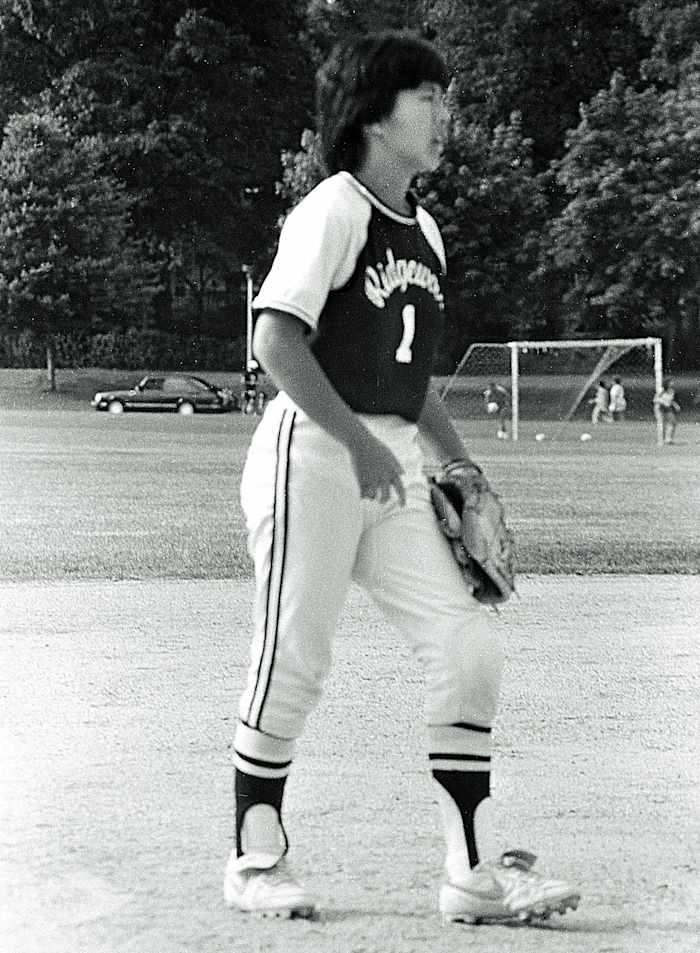
Growing up in Queens, Ng excelled on the diamond in high school before starring at the University of Chicago.
Mike Grattini/USA TODAY NETWORK
She showed that she could outwork the boys, and she showed that she could out-boy them. At company golf tournaments, Ng refused to play from the ladies’ tees, then smoked her drives down the middle of the fairway. She hosted cookouts after Sunday afternoon games. She somehow knew the grimiest dive bar in every road city.
“I’m sure you’ve grown up hearing that you don’t have to like a person to work for them; you just have to respect them,” Bavasi says. “I never have bought that. I think you have to like them. She got a long way with guys like me and Logan [because] listen, man, we’re not the most enlightened people in the world. So I think it mattered that she was likable.”
In spring training 2002, at Dodgertown in Vero Beach, Fla., Bavasi filled a wardrobe-size box with fireworks and headed to an abandoned golf course behind the dormitories. He jammed PVC pipe into sand traps and set off the explosives. White, the scouting director, recalls Bavasi using bottle rockets; Bavasi insists they were mortar fireworks. Whatever they were, they shot some 75 feet into the air.
Once he had the system down, he invited Ng and White along.
“You like to blow s--- up?” she asked.
“Well, no, I don’t blow things up,’” Bavasi said. “I light fireworks off.”
“When I was a kid,” she said, “I lit a dumpster on fire.” (She was eight; it was an accident.)
Most nights they made their mess and then went home, but one night they heard sirens. Evans, reading on his patio, guffawed as he took in the scene: His 33-year-old assistant general manager, his 44-year-old player development chief and his 39-year-old scouting director fleeing in golf carts, pursued by the Vero Beach Police Department.
No matter how well Ng fit in, people in baseball seemed to see her more as a passenger than a driver. She would attend meetings alongside a Dodgers subordinate, Chris Haydock, and the people on the other side of the table would ignore her and address him. “She brought me to take notes!” Haydock says. “It was crazy.”
She was not just a woman in a man’s sport. She was also an Asian American executive in a game with hardly any. At the 2003 general managers’ meetings in Arizona, Mets executive Bill Singer approached Ng and asked where she was from. “I was born in Indiana and I grew up in New York,” she told him. “Where are you from?” he repeated. When she said her family was Chinese, he began babbling in a caricature of an accent. (News of their encounter got out, and Singer publicly apologized a few days later, claiming he had been on a low-carb diet. The Mets fired him.)
In 2011, Torre left L.A. to head baseball operations for MLB and immediately set about persuading Ng to come with him. “I really wasn’t concerned with what she was going to do for us,” he says. “I just wanted her over there.”
It was an unconventional move for an aspiring GM, but Ng was an unconventional candidate. She saw working for MLB as a chance to network. She ran the international operations, putting her in contact with decision-makers for every team and expanding her knowledge of scouting and player development. Still, overhauling the signing process in the Dominican Republic has little in common with building a modern roster.
Ng kept her skills sharp by creating her own challenges. Tasked with renewing contracts with the Caribbean winter leagues, she instead reached out to all 30 major league teams, solicited ideas and revamped the program.
She has held various titles in her career but has always been subtly reminded of this one: Asian American woman. Every compliment seemed to begin with, “I had my doubts, but . . . ” She tried to focus on the but. Over the years, she would come home and mention some indignity: She had overheard a stray comment, someone had spoken over her, someone had tried to take credit for her work. Markward would encourage her to make a fuss. “That’s not how I do things,” she would say.
Ng tried not to dwell on questions of fairness. “People are going to see what they see, and you just have to deal with it,” she says. “I have been able to navigate that path. It’s not easy. Particularly being a woman, first and foremost. There’s this whole idea of inclusion, or ‘Is she allowed here? Is she allowed there?’ And I think those have been obvious obstacles that I’ve had to overcome or endure on a fairly regular, consistent basis. . . . I have to deal with it, and I do.”
She felt her gender affected her treatment in baseball more than her ethnicity did. But Ng understood she owed it to fellow Asian Americans to represent them, too. Last summer, on an MLB call discussing racism and social justice, she described the glares she received in public from people who believed Asian people were to blame for the coronavirus. Chief baseball development officer Tony Reagins, who is Black, was struck by the parallels between her experiences and his. “I didn’t look at it that way until she vocalized it,” he says. “That’s real.”
Through it all, Ng clung to the belief that her work was all that mattered. And she was right, mostly. She had risen up the ranks—just not as high as she dreamed. She worked so hard to be the perfect No. 2 that people in the industry began to see her as just a No. 2.
She interviewed for so many GM jobs that she lost count. She also lost faith. Before every interview, she locked herself in her office to prepare, committing to memory the swings of the club’s teenage prospects and the reputations of its strength coaches. She surveyed friends in the game. She brainstormed the front-office team she would bring with her if hired. Meanwhile, Markward, who co-owns a winery in Oregon, was always convinced she would get the job; while she studied a team’s farm system, he would study neighborhoods in their new city: Where would they live? Where would they eat? Then they would both watch the team hire a man.
“One of the toughest things is you’re not sure if the interview is real, but I still felt the responsibility to go through most of them,” Ng says. “I didn’t interview for every single request, but I did feel a responsibility to keep doing it, to keep the idea of a woman taking over that position as a possibility.”
With every rejection, her friends ran out of words. In 2014, when Ng was at MLB, the Padres chose A.J. Preller over her. A few days later, when she took 10 or so subordinates to dinner, everyone seemed to stare at the table. Finally she ordered a round of drinks. “Enough!” Ng said. “It stinks that I didn’t get the job, but let’s do this. Ask whatever questions you want.”
Her work was all that mattered, she kept telling herself. She just needed to interview with somebody who knew her work. And that was what scared her when Jeter called.
“You think, What if?” Ng says. “What if I don’t get it and it’s Derek? Derek knows me. . . . That’s fear of failure to the nth degree.”
If he didn’t want her, maybe it was because she wasn’t good enough.
Still, Ng accepted his offer, as usual, and she spent hours studying, as always. It went well. Her colleagues at MLB noticed a barely disguised smile. Still, a few days later, when Jeter called back, that fear of failure clutched her. Ng decided to give him what she calls her “last-ditch effort,” a half-hour monologue about her experience and her character and her promise that she would always try to do the right thing. She was talking to the most respected player of his generation, but she was also talking to all the men who had overlooked her, who had doubted her, who had taken credit for her work. And she was talking to herself. After 10 minutes, Ng took a breath. In that pause hung the weight of 30 years of trying to prove she belonged.
“Kim!” Jeter cut in. She had it wrong, he explained. He wasn’t calling to go over her résumé. He was calling to add to it. Kim Ng was the new general manager of the Miami Marlins.
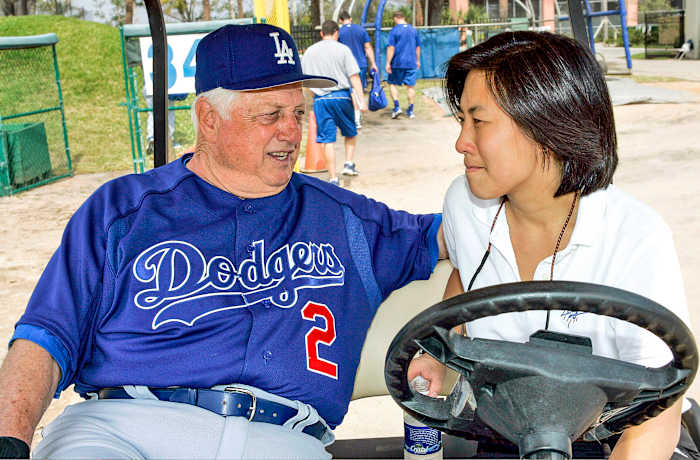
Ng, who grew up as a Yankees fan, won rings with Torre (above, right) and Cashman in New York before taking a job with Lasorda and the Dodgers (bottom).
Jon Soohoo/Getty Images
Ng has already made history. But she did not set out to make history. She set out to be a general manager. This might be her only chance.
All GM jobs offer obstacles—the position is generally open because the last person who held it has been fired—but Miami’s is especially challenging. The NL East is the only division in which every team can credibly claim it is trying to win this season. The Marlins unexpectedly finished 31–29 last year, good enough for a spot in the expanded playoffs, and advanced to the Division Series. A losing season this year would surely be viewed as a failure, but principal owner Bruce Sherman has shown no willingness to spend. Cot’s Contracts estimates the Marlins’ 2021 payroll at $57 million, No. 28 in MLB. (The Mets rank third at $193 million, the Phillies fourth at $187 million, the Nationals fifth at $182 million and the Braves 14th at $130 million.)
The team can also be secretive: Jeter declined, through a spokesperson, to be interviewed for this story, and the same spokesperson listened in on Ng’s interview.
Most of Ng’s franchise-executive experience is with powerhouses in New York and Los Angeles. She will have to be creative and disciplined with the low-budget Marlins. But she sees a team with a talented young core, one of the game’s strongest farm systems and only $6.5 million committed in 2022.
Along with the obvious obstacles, she offers another: The decade she was at MLB, she points out, is the one when the game changed more than in any other in history. Technological and strategic updates have made it almost unrecognizable to old-timers. Still, Ng believes her diverse experience in so many facets of baseball could give her an edge over, for example, a scouting director or quant who ascended straight to the top job.
“I think as a general manager, probably the most important thing is that you have a little understanding of a lot of different areas,” she says. “You’re like the conductor of an orchestra.”
If the orchestra falters, the conductor will be fired—and it will be harder for the next woman to land a GM job. She feels that pressure. And even if the orchestra triumphs, she will probably watch men reap the praise. Within the industry, there were already whispers that any Marlins GM would actually be third in the hierarchy, behind both Jeter and vice president of player development and scouting Gary Denbo. (Jeter and Denbo have been close since 1992, when Denbo managed him in rookie ball.)
Ng is also uniquely ready for the inevitable criticism that every general manager receives. People have questioned her ability her whole career; they didn’t even think she was qualified to be an intern. She recounts dealing with sexist slights as a “regular occurrence.”
She adds, “You have to have patience. You have to educate, you have to redirect. And when all of those fail, look out.”
After Ng got to Florida in January, people kept asking how the job felt. It feels . . . comfortable, she decided. Transactions, scouting reports, personality management—none of it is new. All those years, she wondered if she would become a GM. Once she did, she realized she had been doing the job all along.


































